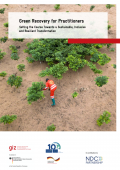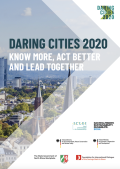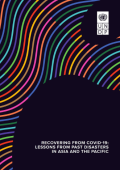Fast Fashion has created cheap and abundant clothing globally, but the natural capital cost has been high, with toxic production practices, degradation of natural resources, massive and growing waste as well as labour injustice. By providing information and analysis on these problems, placing a value on them and quantifying the negative impact on profits and investor returns, Textiles Tracker will support and stimulate a transition to greater sustainability in the industry.
This report focuses on the financial risks arising from the extensive use and misuse of water in the wet processing stage of clothing production, with much of the global production effort situated in areas where water stress and the associated risk is already high.

The paper first introduces the concept of a green recovery, setting out the importance and benefits of bringing this topic into the work of economy, finance and plan- ning ministries. It then breaks down the different components of a green recovery, providing a practical list of stakeholders, tools and outcomes. Finally, it summarises key takeaways for economic advisors to consider in their assignments.
Recovery from the COVID-19 crisis presents an important and unique opportunity for the EU to accelerate its transition towards a climate-neutral and circular economy.

This research demonstrates Daring Cities which is a global, action-oriented virtual forum, designed by ICLEI and the city of Bonn, to empower urban leaders to tackle the climate crisis, especially in the context of the COVID-19 pandemic.

COVID-19 in Asia-Pacific has added to the multitude of risks that the region faces intersecting with natural hazards, conflicts, and fragility. The study highlights learnings from past disasters and features 10 lessons and good practices from Asia-Pacific.
